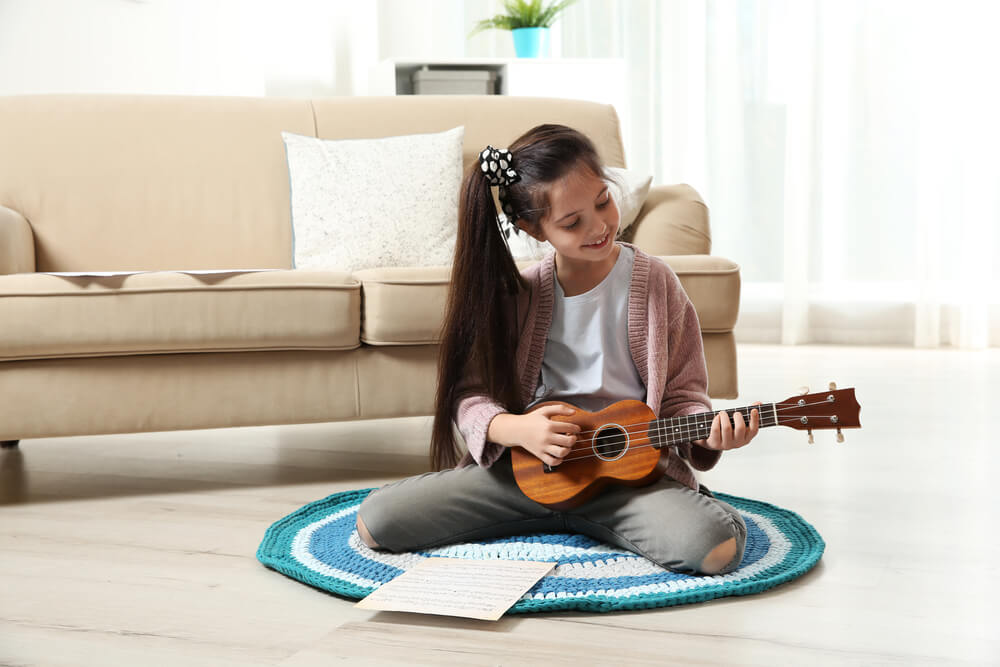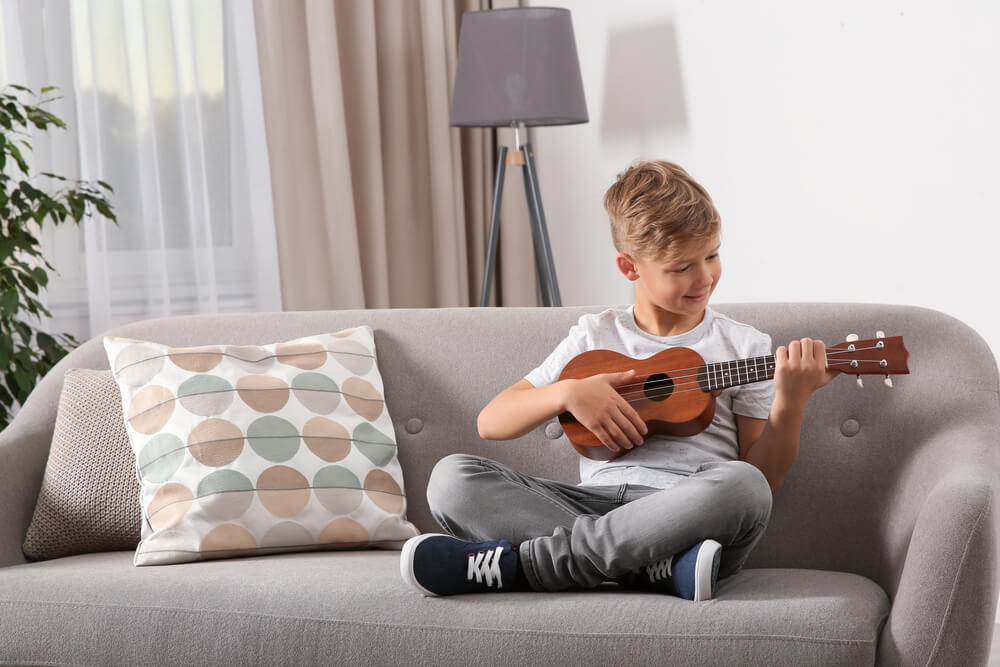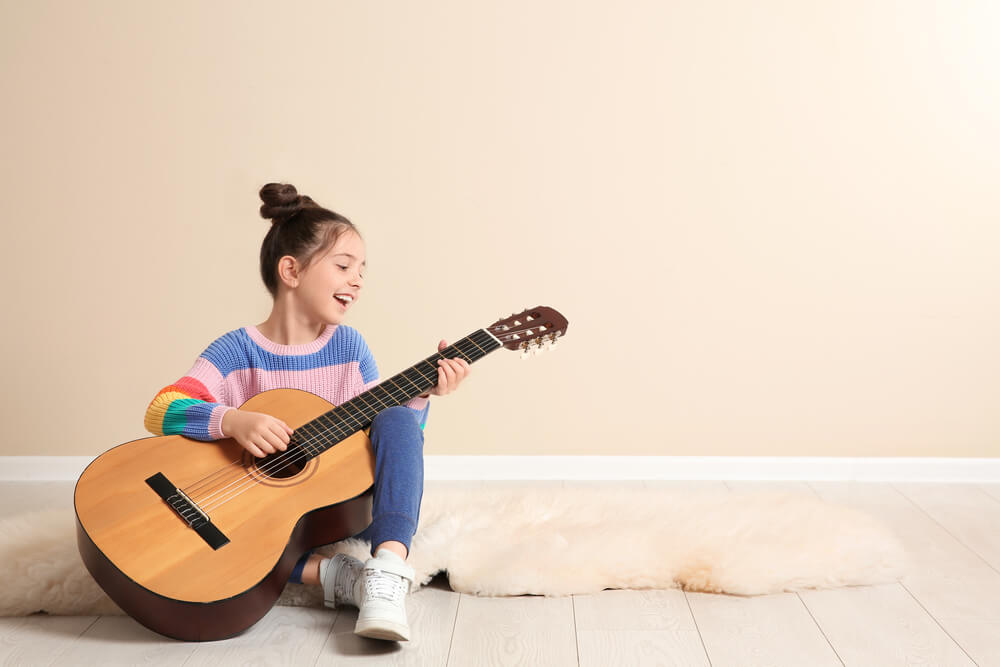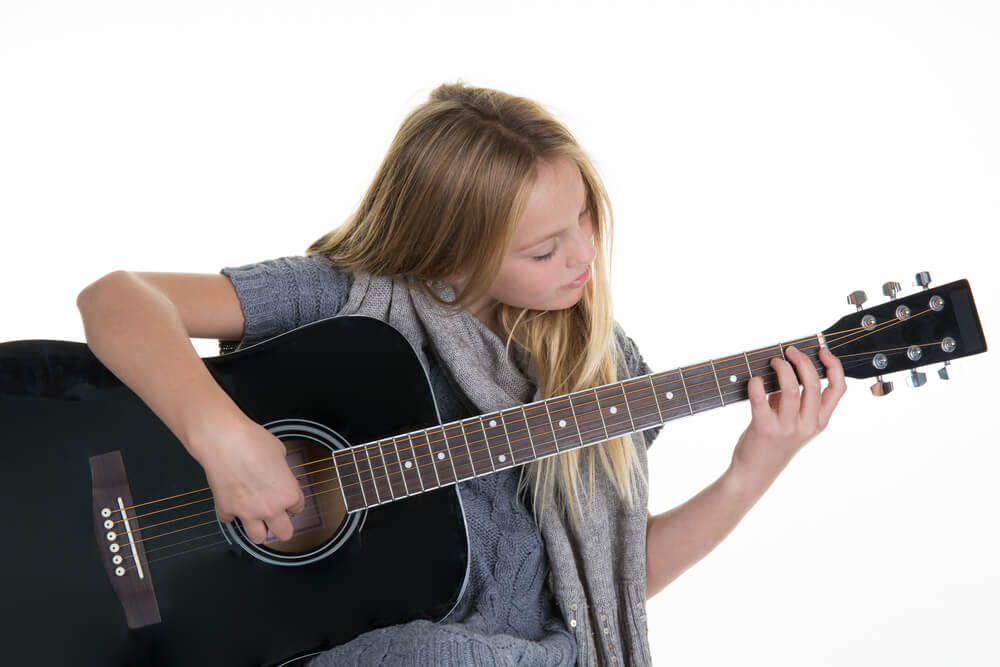Starting guitar lessons can be an exciting endeavor for children, offering them a fun way to discover a passion for music.
To make this journey as enjoyable and fruitful as possible, it’s crucial to assess what age to start guitar lessons and find the right time to introduce guitar lessons.
The ideal age to begin guitar lessons varies for each child, as factors such as the child’s readiness, interest, and physical abilities all play a part in finding the perfect time to start.
It’s important to identify your child’s propensity for learning the guitar by considering their level of interest, patience, and mastery of basic motor skills.
Starting early can be beneficial, as it allows the child to gradually develop their skills and foster a lifelong love for playing the guitar.
Yet, patience is key since each child learns at their own pace, and it may take some time for them to get a grasp of the basics.
Key Takeaways
- Assessing a child’s readiness and interest plays a crucial role in determining the right time to begin guitar lessons
- Starting early can provide benefits, including fostering a passion for music and the opportunity to develop skills over time
- Patience matters, as each child learns at their own pace and may require time to grasp the fundamentals of playing the guitar.
What Age To Start Guitar Lessons
Before starting guitar lessons, it is crucial to determine if your child is ready to learn.
Several factors come into play when assessing your child’s readiness, such as their physical ability, mental capability, and level of interest and passion.
Physical Ability
At a young age, children’s motor skills and finger strength are still developing. This can influence their ability to hold a guitar and press down on the strings.
It is generally a good idea to wait until your child is at least 6 years old before starting guitar lessons.
However, some children may be developmentally ready around the age of 5 to 6.
Mental Capability
Another important aspect to consider is your child’s ability to focus and maintain their attention during guitar lessons.
This usually starts developing around age 7, which is considered a suitable age for most students to begin their guitar journey.
Keep in mind that every child is different, and their ability to concentrate and process information may vary.
Interest and Passion
Nurturing your child’s interest and passion for the guitar is essential for successful learning.
Gauge their enthusiasm by discussing the instrument and observing their reactions to guitar music.
Encouraging them to explore and generate curiosity about the guitar can foster a strong foundation for their future music education.
Remember that each child is unique, and their readiness to start guitar lessons depends on their individual development and personal interests.
Taking these factors into consideration will help set them up for success in their musical journey.
Ideal Age to Start Guitar Lessons
When considering the best age to start guitar lessons, it’s important to remember that every child is different.
Nevertheless, a general guideline is to wait until your child is at least 6 years old before beginning lessons.
This age recommendation is based on the average child’s ability to hold a small-scale guitar and press down the strings comfortably.
That being said, some children may be ready to learn at a younger age, while others may benefit from waiting a bit longer. Factors such as finger strength, coordination, and attention span play a crucial role in determining the most suitable age for learning guitar.
For instance, many experts suggest that around age 7 is the optimal time for most students to begin their guitar learning journey.
One significant aspect to keep in mind is finding the right teacher. A skilled and patient guitar instructor can make a tremendous difference in your child’s progress, regardless of their age.
A good teacher will adapt the lessons to match your child’s abilities and learning style, ensuring a positive and engaging experience.
While some sources suggest starting at the age of 10 for the best outcomes, remember that individual factors should always be taken into account.
Pay close attention to your child’s interests and abilities when deciding the most appropriate age for them to begin guitar lessons.
In conclusion, the ideal age to start guitar lessons varies depending on the child’s development and readiness.
While keeping the general age guidelines in mind, observe your child’s capabilities and consult with a patient and skilled guitar teacher to ensure a successful and enjoyable learning experience.
Why Starting Early Is Beneficial
Starting guitar lessons at an early age can provide numerous benefits for children’s cognitive and emotional development.
When a child begins learning guitar around the age of 7, they have the opportunity to develop a solid musical foundation that lasts a lifetime.
Here are some key benefits of starting early:
- Building essential skills: Children who start guitar lessons early can develop crucial skills such as rhythm, pitch recognition, and finger dexterity. These skills make it easier for them to progress as they grow older and are invaluable in their further musical pursuits.
- Improving memory and concentration: Engaging in regular music practice strengthens cognitive abilities. Learning to play guitar requires focus, attention to detail, and memorization. These essential skills are transferable to other aspects of a child’s life, including academics.
- Enhancing creativity and self-expression: Learning an instrument allows children to tap into their creative side and express themselves through music. As they develop their skills, they can experiment with different sounds, styles, and techniques, fostering a sense of individuality and artistic growth.
- Boosting confidence and self-esteem: Children who play guitar often experience a sense of accomplishment as they master new skills and techniques. This success can bolster their self-confidence and increase their motivation to tackle new challenges.
- Developing discipline and patience: Learning to play the guitar requires discipline, patience, and perseverance. Children who practice regularly and push through challenges develop a strong work ethic that carries over into other aspects of their lives.
By starting guitar lessons early, you are setting your child on a path for musical success and personal growth.
Not only will they reap the cognitive and emotional benefits, but they will also gain lifelong skills that can bring joy and personal fulfillment.
Why Patience Matters
Forcing Versus Nurturing
When it comes to learning the guitar, it’s important for parents and students to understand the difference between forcing and nurturing.
Forcing a child to learn an instrument before they are ready can create long-term resistance and frustration while nurturing their natural curiosity and genuine interest will lead to a much more enjoyable learning experience.
The best age to learn guitar is typically around age 7, but every child is different.
Be patient, and let your child’s development and interest in the instrument guide your decision.
Accepting Progress Over Time
Learning an instrument like the guitar takes time, persistence, and dedicated practice. It’s crucial to have patience not only while determining the ideal starting age but also in monitoring progress over time.
As a parent, you should encourage your child and celebrate their milestones, even if it seems like they are taking longer than expected to grasp certain concepts or techniques. Remember, every student learns at their own pace.
Emphasize the importance of practice and perseverance, and let them know that their efforts are appreciated.
With patience and support, you can make a positive impact on your child’s journey into the world of music.
Learning the Basics: The First Lessons

As you embark on your guitar learning journey, it’s crucial to establish a solid foundation.
Begin by finding a comfortable seating position that allows you to hold the guitar firmly in your lap.
Make sure to use a small-scale guitar if you are starting at a young age.
In your first lessons, focus on mastering basic guitar skills:
- Holding the guitar: Position your guitar on your lap, with the body against your chest and the neck parallel to the floor. For right-handed players, your right hand will strum or pick the strings while your left-hand presses down on the frets. The reverse applies to left-handed players.
- Proper finger placement: When playing chords or individual notes, apply pressure directly behind the frets. Avoid placing your fingers on top of the frets, as this may produce a buzzing sound or muted tone.
- Strumming technique: Practice strumming smoothly while maintaining a consistent rhythm. Experiment with different picking patterns to find what feels most natural for you.
- Learning basic chords: Start with a few fundamental chords, such as the G major, C major, and D major chords. Take your time to become comfortable with switching between these chords smoothly.
- Familiarize yourself with guitar sheet music and tabs: Learn how to read guitar sheet music and tablature notation. This will enable you to access a wide range of songs to learn and practice.
- Regularly practicing guitar scales and arpeggios: Incorporate daily practice of scales and arpeggios in your routine to boost your finger dexterity and overall technique.
Patience and consistency are key in these early stages of your guitar-playing journey.
Remember that hiring a guitar teacher can be immensely beneficial in guiding you as you learn the basics and develop proper techniques.
Choosing the Right Guitar for Kids
When looking for a guitar for your child, it’s essential to find one that is the right size and comfortable for them to hold and play.
Here are some factors to consider when choosing the perfect guitar for your kid.
First, consider the age and size of your child. Younger children or those with smaller hands may benefit from a smaller-scale guitar, like a 1/2 or 3/4 size.
For example, the FA-15N ¾ acoustic guitar can be a suitable choice for kids, as it comes with a padded gig bag and has a comfortable size.
Another important aspect is the type of guitar. There are two main types: acoustic and electric.
An acoustic guitar is often recommended for beginners, as it doesn’t require additional equipment like an amplifier, and it generally has a softer sound that can be less intimidating for new players.
Electric guitars, on the other hand, can offer a wider range of sounds and styles but might require a bit more investment in terms of gear.
For young beginners, it’s also a good idea to choose a guitar with nylon strings instead of steel ones. Nylon strings are easier on the fingers and allow for extended practice sessions without causing pain or discomfort.
Many beginner guitars, especially those designed for kids, come with nylon strings.
Additionally, consider the quality and the price point of the guitar. While it’s not necessary to spend a fortune on a beginner guitar, it’s essential to find one that is well-made and will last for several years.
Look for a guitar with a solid wood top and sturdy construction, as well as a pleasant tone that your child will enjoy playing.
When selecting the right guitar for your child, consider their age, size, type of guitar, string material, and overall quality and price point.
By taking these factors into account, you can ensure that your child has a positive and enjoyable learning experience as they start their guitar journey.
How to Nurture Talents in Children
When it comes to nurturing talents in children, especially in learning guitar, there are a few essential aspects to consider.
In this section, we will discuss the role of parents and the importance of finding a good guitar teacher.
Role of Parents
As a parent, you play a vital role in nurturing your child’s interest in guitar. Firstly, you should encourage their curiosity and appreciation for music.
This can be done by playing various music genres at home or attending concerts and musical events together.
Moreover, it’s essential to provide a supportive environment for your child to practice playing guitar. This includes setting up a dedicated space free from distractions and investing in quality instruments to ensure their success.
Keep in mind that positive reinforcement and patience are crucial when your child is learning a new skill.
Finding a Good Guitar Teacher
Selecting the right guitar teacher is critical to nurturing your child’s talent.
A good teacher should have experience in teaching children of different ages and can adapt their teaching methods to your child’s cognitive and emotional development.
Additionally, look for a guitar teacher who is patient, encouraging, and able to make lessons engaging and enjoyable.
This allows your child to cultivate a strong connection with music and develop their skills with confidence.
Collaborating with the teacher to set achievable goals and monitor progress will also contribute to your child’s growth.
Finally, remember to be open to their feedback and modify practices at home based on their guidance to optimize your child’s learning experience.
Frequently Asked Questions
At what age can children begin learning guitar?
Children can start learning guitar as early as around age 7, depending on their ability to hold a small-scale guitar and press down the strings comfortably.
However, keep in mind that each child is different, and there is no strict age requirement for starting guitar lessons.
How do guitar lessons vary for different age groups?
Guitar lessons are tailored to the child’s age, focusing on their physical abilities, cognitive development, and interests.
Younger children may require lessons involving shorter practice sessions, smaller guitar sizes, and simplified exercises.
As they grow older, the lessons can become more complex, focusing on different playing techniques, music theory, and diverse musical genres.
Are there different guitar types for beginners of different ages?
Yes, there are different guitar types tailored to beginners of various ages.
Children might start with a small-scale guitar designed for their age group and physical size, making it easier for them to hold, press down the strings, and develop proper playing posture.
For older beginners, full-sized guitars with more comfortable necks and body shapes can be used.
What factors besides age should be considered when starting guitar lessons?
Besides age, you should consider the child’s physical abilities, such as finger strength and hand-eye coordination.
Their level of interest and motivation for learning is also crucial, as well as their exposure to music and ability to concentrate during lessons.
Lastly, finding a suitable instructor who understands the child’s needs and learning style is essential for success.
Is there an age limit for learning guitar?
No, there is no age limit for learning guitar. Adults and even seniors can start learning guitar and progress at their own pace, depending on their dedication, motivation, and practice time.
The key is to find an instructor who can tailor the lessons to the individual needs and goals of the adult learner.
How do adult guitar lessons differ from those for children?
Adult guitar lessons focus more on the learner’s specific goals, interests, and existing music knowledge.
Adults typically have a more developed sense of taste and might prefer certain genres, styles, or techniques.
Instructors will cater to these preferences while ensuring that proper foundational skills are developed.
Also, adults have different learning speeds and may require a different approach to teaching, especially if they have prior music experience.









